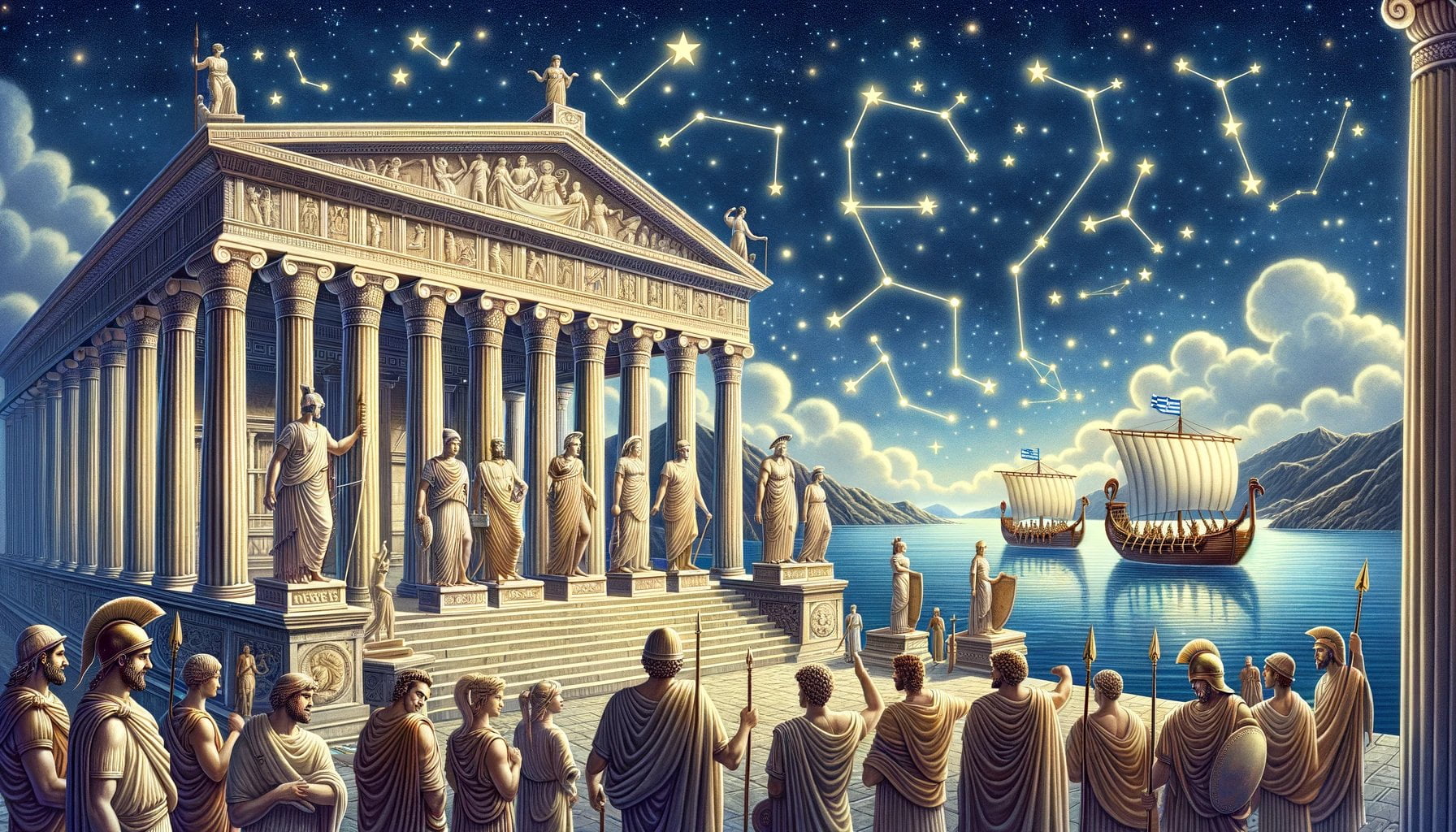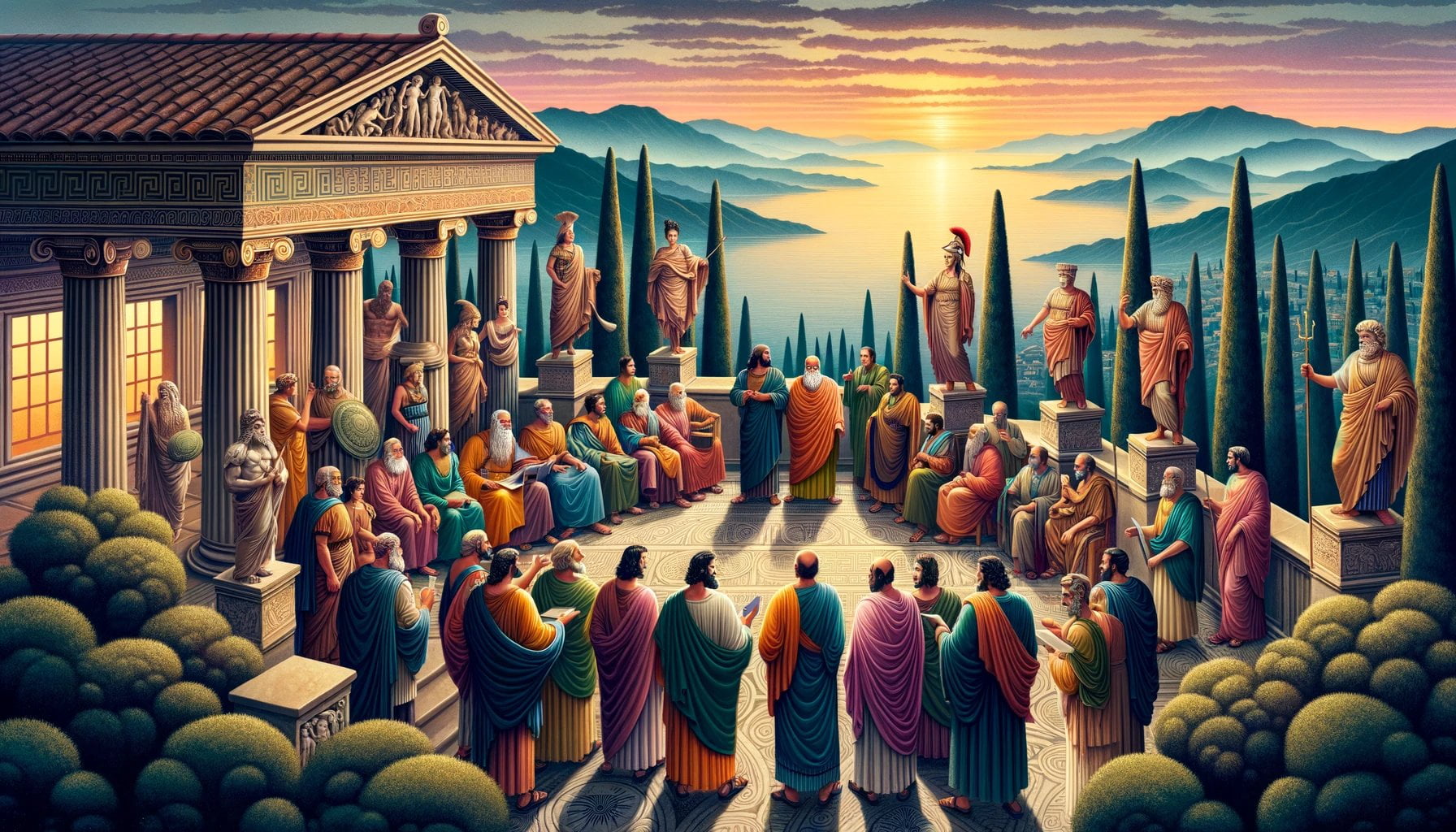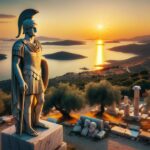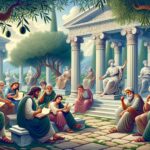Unraveling the Powerful Rulers of Ancient Greece takes readers on a captivating journey through the annals of Greek history, unveiling the enigmatic leadership of the ancient world. With a deep understanding of the political, cultural, and societal tapestry of that era, this comprehensive analysis brings to light the influential figures who shaped and defined Greek civilization. From the astute statesmanship of Pericles to the legendary conquests of Alexander the Great, this article delves into the leadership styles, accomplishments, and enduring legacies left behind by these remarkable rulers.
Key Takeaways:
- Ancient Greece was ruled by various statesmen, generals, and kings from the 7th century B.C. to the 1st century B.C.
- Notable Greek rulers include Hippias, Alcibiades, Draco, Philip II, Alexander the Great, and Lysimachus.
- Hippias governed Athens after the death of his father, Pisistratus, and worked closely with his brother Hipparchus until his assassination.
- Alcibiades was an Athenian statesman and general who played a significant role in agitating against Sparta during the Peloponnesian War.
- Draco is considered one of the earliest statesmen and politicians in ancient Greece, known for his contributions as a law codifier.
- Philip II, king of Macedon and Greece, laid the foundation for Alexander the Great’s conquests through his skills as a strategist and diplomat.
- Alexander the Great achieved remarkable military victories and expanded the reach of the Greek empire into Asia.
- Lysimachus served as a general under Alexander the Great and later became the ruler of Thrace, west Asia Minor, and Macedonia.
- Greek rulers faced challenges from rival powers such as the Persians, Spartans, and Alcmaeonidae during their reigns.
- The legacy of ancient Greek rulers continues to shape our understanding of history, politics, and culture, including democracy, military tactics, and the spread of Greco-Roman culture.
Ancient Greek Rulers: Preserving and Shaping History

Ancient Greece, a civilization known for its influential figures and rich history, was governed by a diverse array of statesmen, generals, and kings who left lasting legacies. In this article, we will explore the profiles and contributions of some of the most notable Greek rulers, shedding light on their leadership styles, achievements, and the impact they had on Greek history.
Hippias: Upholding the Athenian Legacy
Hippias, the eldest son of Pisistratus, ascended to power in Athens following his father’s death. Collaborating closely with his brother Hipparchus, Hippias worked towards maintaining the political stability and cultural prosperity that his family had established. Unfortunately, their reign was cut short when Hipparchus was assassinated in 514 B.C. Yet, Hippias’ commitment to Athenian traditions and governance left a lasting mark on the city-state.
Alcibiades: The Adventurous Athenian Statesman
Alcibiades, renowned both as a statesman and a general, played a significant role in the tumultuous political landscape of ancient Athens. Initially a devoted follower of Socrates, Alcibiades later turned to politics, becoming a prominent figure during the Peloponnesian War. Known for his charisma and eloquence, he fervently advocated against Sparta and made efforts to assert Athens’ dominance. Alcibiades’ influence on Athenian political affairs showcased his navigational skills in a world driven by power dynamics.
Draco: Pioneering Legal Reformation
Considered one of the earliest statesmen in ancient Greece, Draco rose to prominence for his reforms in shaping legal frameworks. His comprehensive legal code, which became known as the “draconian laws,” aimed to bring order and justice to the Athenian society. Though his laws were known for their severity, Draco’s contribution as a law codifier laid the foundation for future legal advancements in Greece.
Philip II: Laying the Groundwork for Greatness
Philip II, the king of Macedon and Greece from 359–336 B.C., exemplified exceptional military strategy and diplomatic finesse. He saw the potential of a united Greek empire and undertook significant political and military campaigns to achieve this vision. Philip II’s astute leadership set the stage for his son, Alexander the Great, to embark on his groundbreaking conquests.
Alexander the Great: A Military Genius and Visionary
Alexander the Great, one of history’s most iconic figures, transformed the Greek empire into a global superpower. From 356–323 B.C., his military prowess and sheer ambition led to the expansion of the empire’s reach into Asia. Alexander’s strategies and tactical brilliance on the battlefield solidified his legacy as one of the greatest military leaders the world has ever known.
Lysimachus: A Versatile General turned Ruler
Lysimachus, esteemed for his role as a general under Alexander the Great, rose to power as the ruler of Thrace, west Asia Minor, and Macedonia. His reign, spanning from approximately 355–281 B.C., showcased his ability to govern diverse territories and maintain order in the wake of Alexander’s demise. Lysimachus’ leadership skills allowed him to navigate the complexities of ruling in a post-conquest era.
The ancient Greek rulers were not without their share of challenges. They faced formidable adversaries, including rival powers like the Persians, Spartans, and Alcmaeonidae. Despite these obstacles, their contributions in terms of military triumphs, political alliances, and cultural advancements propelled Greece into a position of influence.
Studying the achievements and interactions of these rulers grants us invaluable insights into the foundations of democracy, military strategy, and the spread of Greco-Roman culture. Through their legacies, we can trace the evolution of ancient Greek society and its enduring impact on our understanding of history, politics, and culture.
Sources:
1. Ancient Greece Facts – Ancient Greek Rulers
2. Infoplease – Rulers of Ancient Greece
Laconia was a region in ancient Greece that played a significant role in shaping the history of the country. Learn more about Laconia and its fascinating history in ancient Greece by clicking here.
The Black Sea was a crucial part of ancient Greece’s trading routes and played a vital role in its economy. Discover the intriguing connections between ancient Greece and the Black Sea by clicking here.
Ancient Greece achieved numerous remarkable accomplishments in various fields, from philosophy and architecture to art and democracy. Explore the impressive achievements of ancient Greece by clicking here.
Rhodes, an island in ancient Greece, was known for its rich history, vibrant culture, and magnificent ancient ruins. Immerse yourself in the captivating story of Rhodes in ancient Greece by clicking here.
The Battle of Salamis was a significant event in ancient Greek history, showcasing the naval power and strategic brilliance of the Athenians. Delve into the epic tale of Salamis in ancient Greece by clicking here.
Examine the Rise and Power of Famous Rulers like Alexander the Great and Pericles
Ancient Greece holds a significant place in history, with its rich cultural heritage, political developments, and influential leaders. In this article, we will delve into the remarkable lives and legacies of two famous rulers: Alexander the Great and Pericles.
Alexander the Great: The Conqueror of Empires
Alexander III, commonly known as Alexander the Great, was born in 356 BCE in Pella, Macedonia. As the son of King Philip II and Olympias, Alexander inherited a strong military legacy. Following his father’s assassination in 336 BCE, Alexander ascended the throne and embarked on an epic mission to conquer the vast Persian Empire.
The Persian Expedition and Battle of Issus
One of the key milestones in Alexander’s conquest was the Battle of Issus. In winter 334–333 BCE, he successfully conquered western Asia Minor, displaying his military prowess. It was during this time that Alexander faced a significant challenge at Issus, where he decisively defeated the Persian forces.
Conquest of Mediterranean Coast and Egypt
After the Battle of Issus, Alexander continued his ambitious march southward into Syria and Phoenicia. His objective was to isolate and capture the strategically crucial city of Tyre. While besieging Tyre, the Persian king, Darius, offered a substantial ransom for the return of his family. Nevertheless, Alexander pressed forward, successfully taking control of the city. In November 332 BCE, he reached Egypt, where he was warmly welcomed by its people.
Impact and Legacy
Alexander the Great’s conquests created one of the largest empires of the ancient world, stretching from Greece to northwestern India. His empire spread Greek culture and left a lasting impact on the successor empires that followed. Although Alexander’s reign was relatively short, lasting only about a decade, his military brilliance and vision continue to inspire historians and strategists alike.
Source: Britannica, Khan Academy
Pericles: The Architect of Athenian Democracy
Pericles was a renowned statesman, military leader, and orator who played a pivotal role in shaping ancient Athens. Known as the statesman of the golden age, Pericles was born around 495 BCE and rose to prominence during the 5th century BCE.
Political Leadership and Cultural Influence
Pericles upheld the democratic principles cherished by the Athenians. As a skillful orator, he used his charisma and rhetoric to secure his position of influence. Pericles led Athens during its heyday, fostering stability and prosperity, while also promoting the flourishing of art, philosophy, and architecture. The construction of the Parthenon on the Acropolis stands as a testament to Pericles’ commitment to artistic and cultural advancements.
Leadership During the Peloponnesian War
The Peloponnesian War, fought between Athens and Sparta, presented a significant challenge for Pericles. Despite the mounting pressure, he championed strategic leadership and advocated for the strength of Athens. However, as the war progressed, Pericles faced criticism and blame for its setbacks.
Pericles’ Enduring Influence
Pericles’ contributions to Athenian democracy and cultural achievements have endured the test of time. His legacy lies in laying the foundation for a democratic system that influenced future political systems. Pericles’ leadership and his emphasis on the importance of culture and democracy leave a compelling legacy for those seeking insights into ancient Greece.
Key Takeaways:
- Alexander the Great:
- Born in 356 BCE in Pella, Macedonia, Alexander became the king after his father’s assassination.
- He embarked on a mission to conquer the Persian Empire and achieved remarkable military success.
- Alexander’s empire stretched from Greece to northwestern India, spreading Greek culture and leaving a lasting impact.
- Pericles:
- A prominent Athenian statesman, Pericles championed democratic principles and cultural advancements.
- He led Athens during its golden age, fostering stability and promoting art, philosophy, and architecture.
- Despite the challenges of the Peloponnesian War, Pericles left a lasting influence on Athenian democracy.
Citation:
Britannica
Explore the Leadership Styles and Strategies Employed by Ancient Greek Rulers
As we dive into the captivating world of ancient Greece, we are transported back in time to witness the remarkable leadership styles and strategies employed by the influential rulers who shaped Greek history. From the development of democracy to the contributions in various fields, the impact of ancient Greek leaders still resonates today.
In exploring the leadership styles of ancient Greek rulers, it is fascinating to discover that their ideas and principles are still relevant in the modern world. We can gain valuable insights by studying these leaders and their approaches to governing and leading their societies.
The Evolution of Greek Leadership Styles
The concept of leadership in ancient Greece was multifaceted, encompassing various dimensions. From rulers who were self-centered and status-conscious to those who prioritized conflict resolution and procedural fairness, the leadership landscape was diverse.
Ancient Greek thinkers and writers, such as those portrayed in the epics like the “Iliad” and the “Odyssey,” played a significant role in shaping the ideals and perceptions of leadership. The principles depicted in these epic poems continue to resonate and provide insights into effective leadership strategies.
Insights from Ancient Greek Rulers
Pericles: A Champion of Democracy and Cultural Advancements
One of the prominent ancient Greek statesmen, Pericles, was a staunch advocate of democratic principles during the golden age of Athens. He stood as a visionary leader, promoting art, philosophy, and architecture, making Athens a vibrant center of intellectual and cultural growth.
However, Pericles faced challenges during his leadership, particularly during the Peloponnesian War. These setbacks did not overshadow his legacy, as he laid the foundation for democratic governance and cultural advancements that have left an indelible mark on history.
Alexander the Great: A Military Strategist and Cultural Unifier
Alexander the Great, born in 356 BCE, emerged as a extraordinary leader, expanding the Greek empire into Asia through his military brilliance. His empire spanned from Greece to northwestern India, spreading Greek culture and leaving a lasting impact on the regions he conquered.
Alexander’s leadership style demonstrated his ability to inspire loyalty among his troops and effectively integrate diverse cultures within his empire. The strategies he employed in military campaigns, such as combining Macedonian and Persian forces, showcase his innovative and adaptable approach to leadership.
Key Takeaways:
- Ancient Greek leaders employed diverse leadership styles, from self-centered to conflict resolution-oriented approaches.
- The principles of leadership depicted in ancient epics like the “Iliad” and the “Odyssey” continue to provide valuable insights.
- Pericles championed democratic principles and promoted cultural advancements in Athens, leaving a lasting legacy.
- Alexander the Great showcased military brilliance and cultural unification, expanding Greek influence across vast territories.
Citation:
– National Geographic. (n.d.). Greek leaders and thinkers. Retrieved from [URL]
– The Conversation. (n.d.). The “Odyssey” and ancient Greek ideas of leadership. Retrieved from [URL]
Lastly, remember that leadership is a universal concept, transcending time and national culture. By exploring the leadership styles of ancient Greek rulers, we gain a deeper understanding of the dynamics of power, the complexities of governance, and the enduring legacy these leaders left behind. So, let us embark on this journey together, exploring the captivating world of ancient Greece and the leaders who shaped its course.
Discuss the Enduring Legacies and Impact of Greek Rulers on Western Civilization
The ancient Greeks have left behind a rich and influential legacy that continues to shape Western civilization today. From their advancements in various fields to their contributions to politics and philosophy, the Greek rulers played a vital role in shaping the course of Greek history and influencing the world around them.
The Foundation of Greek Civilization
Throughout the Archaic period, Greek city-states were established, setting the stage for the development of Greek civilization. These city-states laid the foundation for democratic governance, a concept that endures to this day in many countries around the world. The enduring impact of ancient Greek rulers on Western civilization can be observed in the lasting legacy of democracy.
The Influence of Greek Culture
Ancient Greek leaders such as Pericles, Socrates, Plato, Aristotle, Pythagoras, and Hippocrates made significant contributions to the fields of philosophy, literature, art, and science. Their ideas and teachings have had a profound impact on Western thought, culture, and civilization. The enduring legacies of these thinkers can be seen in the fields of art, literature, philosophy, science, and politics.
Greek art and literature have inspired artists and writers for centuries, with their timeless beauty and profound messages transcending time and culture. The works of ancient Greek playwrights continue to be performed on stages around the world, highlighting the enduring impact of their storytelling and dramatic techniques. The architectural achievements of ancient Greece, such as the Parthenon and the Temple of Apollo at Delphi, serve as iconic symbols of Western civilization’s cultural heritage.
The Influence on Western Thought and Politics
Ancient Greek political ideas and practices have significantly influenced modern forms of government. The principles of democracy, as conceived by the ancient Greeks, have provided a foundation for democratic systems worldwide. The Greek concept of citizenship and the importance of civic involvement continue to shape modern political thought and participation.
The enduring legacies and impact of Greek rulers on Western civilization can also be seen in the fields of philosophy and science. Ancient Greek philosophers, including Socrates, Plato, and Aristotle, explored fundamental questions about human existence, ethics, and knowledge, laying the groundwork for Western philosophical traditions that continue to be studied and debated today.
Key Takeaways:
- Ancient Greek rulers and thinkers made significant contributions to philosophy, literature, art, and science, which continue to influence Western civilization.
- The enduring legacies of Greek rulers can be seen in the fields of art, literature, philosophy, science, and politics.
- Greek political ideas, including the concept of democracy and civic engagement, have shaped modern forms of government.
- The architectural achievements of ancient Greece serve as enduring symbols of Western civilization’s cultural heritage.
Sources:
– World History Encyclopedia
– National Geographic Society

FAQ
Q1: Who were the most notable Greek rulers in ancient Greece?
A1: Some of the most notable Greek rulers in ancient Greece include Hippias, Alcibiades, Draco, Philip II, Alexander the Great, and Lysimachus.
Q2: What contributions did Alexander the Great make to ancient Greece?
A2: Alexander the Great, also known as Alexander III or Alexander of Macedonia, created one of the largest empires of the ancient world, stretching from Greece to northwestern India. His empire spread Greek culture and had long-lasting effects on the successor empires.
Q3: What was the significance of the Battle of Issus in Alexander the Great’s conquest?
A3: The Battle of Issus was a major battle where Alexander the Great defeated the Persians. It was a significant milestone in his conquest of the Persian Empire.
Q4: How did ancient Greek rulers influence democracy and leadership?
A4: Ancient Greek rulers, such as Alexander the Great, played a crucial role in shaping Greek civilization and its concepts of democracy and leadership. Their ideas and writings, along with Greek philosophers like Socrates, Plato, and Aristotle, have had a profound influence on Western thought and leadership.
Q5: What cultural and intellectual legacies did ancient Greece leave behind?
A5: Ancient Greece made significant contributions to various fields, including philosophy, politics, mathematics, astronomy, medicine, literature, theater, sculpture, and architecture. Greek political ideas have influenced modern forms of government, Greek art has inspired artists for centuries, and Greek literature has had a profound impact on modern drama. The enduring legacies of ancient Greece have had an unparalleled influence on Western thought, culture, and civilization.












